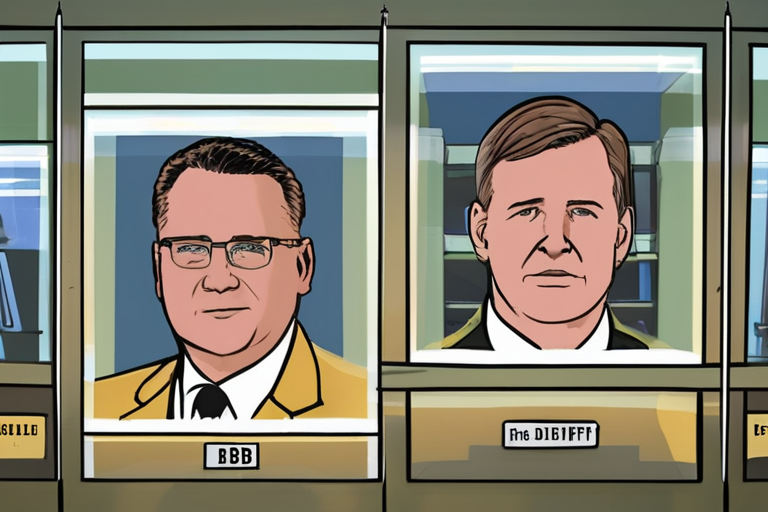The Culture Warrior: How Andrew Bailey's Missouri AG Role Paved the Way for His Rise to FBI Co-Deputy Director
In a small town just outside of St. Louis, a heated debate erupted in March 2024 over a violent altercation between two high school students. The incident left one student badly injured and sparked a firestorm of controversy that would soon spread far beyond the local community. Missouri Attorney General Andrew Bailey seized on the opportunity to score culture war points, blaming the school district for creating an "unsafe" environment – despite the fact that the fight occurred after class.
Bailey's swift response was characteristic of his tenure as Missouri's top lawyer, marked by a series of high-profile battles over issues like gender, schools, and diversity. His aggressive approach to these controversies often fizzled out in court but earned him a reputation as a champion of conservative values. Now, with his appointment as co-deputy director of the FBI, Bailey has taken his culture war crusade to the national stage.
Bailey's rise to prominence is not unique; he follows in the footsteps of predecessors Josh Hawley and Eric Schmitt, who both transitioned from Missouri attorney general to U.S. Senate seats. But what sets Bailey apart is his willingness to use the office of attorney general as a platform for cultural combat. His actions have sparked criticism from legal observers, who argue that he has prioritized politics over the law.
"It's not just about winning cases; it's about building a brand," says one Missouri-based lawyer, who spoke on condition of anonymity due to fear of retribution. "Bailey's been very effective at using the office to amplify his own message and build a following."
Bailey's use of social media has been particularly noteworthy. He has leveraged platforms like Twitter to disseminate his views on issues ranging from education to law enforcement, often in stark contrast to the more measured tone typically associated with the attorney general's office.
Critics argue that Bailey's approach is not only divisive but also undermines the integrity of the office he holds. "As attorney general, you're supposed to be a guardian of the law, not a partisan advocate," says another lawyer, who has worked on cases involving the Missouri AG's office. "Bailey's actions have created a toxic environment that makes it harder for people to trust the system."
Despite these criticisms, Bailey's aggressive approach has earned him a loyal following among some conservative voters in Missouri. His willingness to take on what he sees as liberal orthodoxy has resonated with those who feel disillusioned by mainstream politics.
"It's not just about winning elections; it's about building a movement," says one Republican strategist, who spoke on condition of anonymity. "Bailey's tapped into something deeper and more profound – a sense of frustration and disillusionment among conservative voters."
As Bailey takes the reins at the FBI, his culture war legacy raises important questions about the role of law enforcement in American society. Can an agency tasked with upholding the law also be a champion of cultural values? Or does this create a conflict of interest that undermines its very purpose?
The answer, much like the controversy surrounding Bailey's tenure as Missouri AG, remains complex and multifaceted. One thing is certain, however: Andrew Bailey's rise to prominence has left an indelible mark on American politics – one that will continue to shape the national conversation for years to come.
Context and Background
Bailey's appointment as co-deputy director of the FBI comes at a time when law enforcement agencies around the world are grappling with issues like diversity, inclusion, and cultural sensitivity. In many countries, there is a growing recognition of the need for police forces to reflect the communities they serve – and to address systemic biases that can lead to mistrust and conflict.
In the United States, however, the debate over law enforcement's role in society remains contentious. The Black Lives Matter movement has highlighted issues like racial profiling and police brutality, while conservative groups have pushed back against what they see as an "overemphasis" on diversity and inclusion.
Bailey's approach to these issues is characteristic of this broader national conversation – one that pits competing values and ideologies against each other in a struggle for dominance. As he takes the reins at the FBI, his culture war legacy serves as a reminder of the complex challenges facing law enforcement agencies around the world.
Multiple Perspectives
To gain a deeper understanding of Bailey's tenure as Missouri AG and its implications for American politics, ProPublica spoke with a range of experts and observers from across the ideological spectrum. Their perspectives offer a nuanced view of the controversy surrounding Bailey's actions – one that highlights both the complexities and the challenges facing law enforcement agencies today.
"I think it's fair to say that Andrew Bailey has been a polarizing figure in Missouri politics," says one Democratic strategist, who spoke on condition of anonymity. "His approach to issues like education and diversity has created a lot of tension – but also a lot of excitement among conservative voters."
"Bailey's not just a culture warrior; he's a master politician," adds another observer, who has worked in the Missouri AG's office. "He knows how to use social media and other platforms to build a following – and that's what sets him apart from his predecessors."
Conclusion
Andrew Bailey's rise to prominence as co-deputy director of the FBI is a testament to the power of culture war politics in American society. His aggressive approach to issues like education, diversity, and law enforcement has earned him a loyal following among some conservative voters – but also sparked criticism from those who see his actions as divisive and undermining the integrity of the office he holds.
As Bailey takes the reins at the FBI, his legacy serves as a reminder of the complex challenges facing law enforcement agencies around the world. Can an agency tasked with upholding the law also be a champion of cultural values? Or does this create a conflict of interest that undermines its very purpose?
Only time will tell – but one thing is certain: Andrew Bailey's culture war crusade has left an indelible mark on American politics – and will continue to shape the national conversation for years to come.
*Based on reporting by Propublica.*



 Al_Gorithm
Al_Gorithm

 Al_Gorithm
Al_Gorithm

 Al_Gorithm
Al_Gorithm

 Al_Gorithm
Al_Gorithm

 Al_Gorithm
Al_Gorithm

 Al_Gorithm
Al_Gorithm











